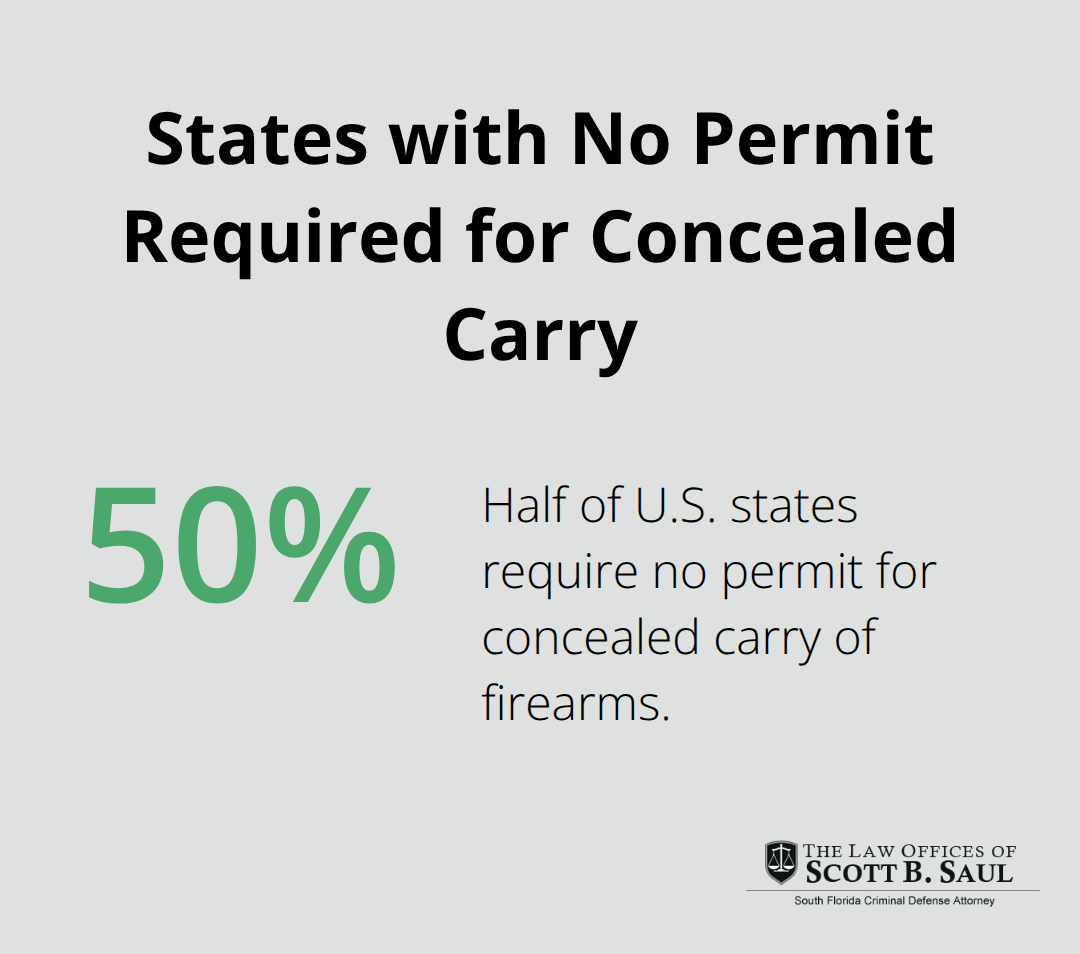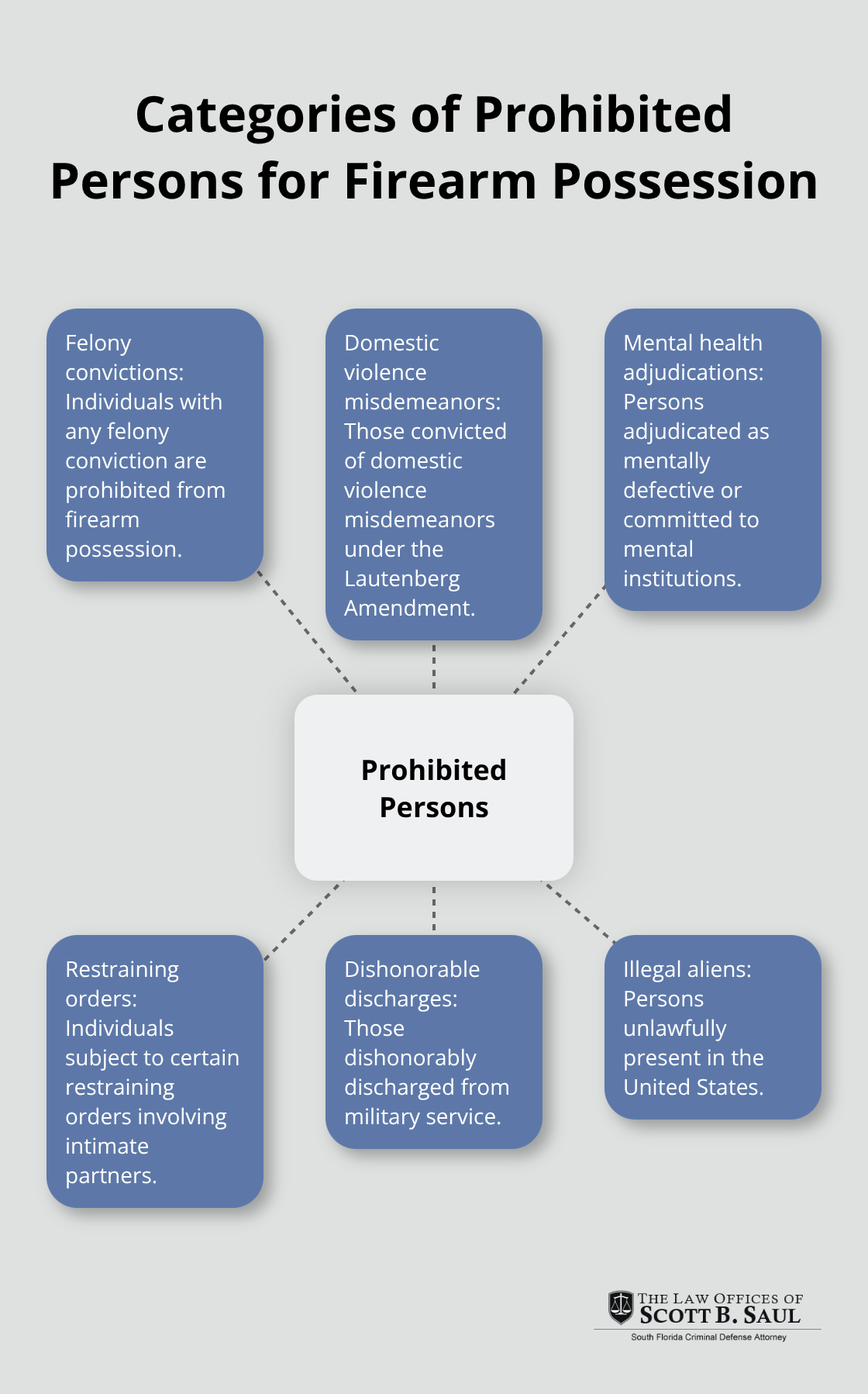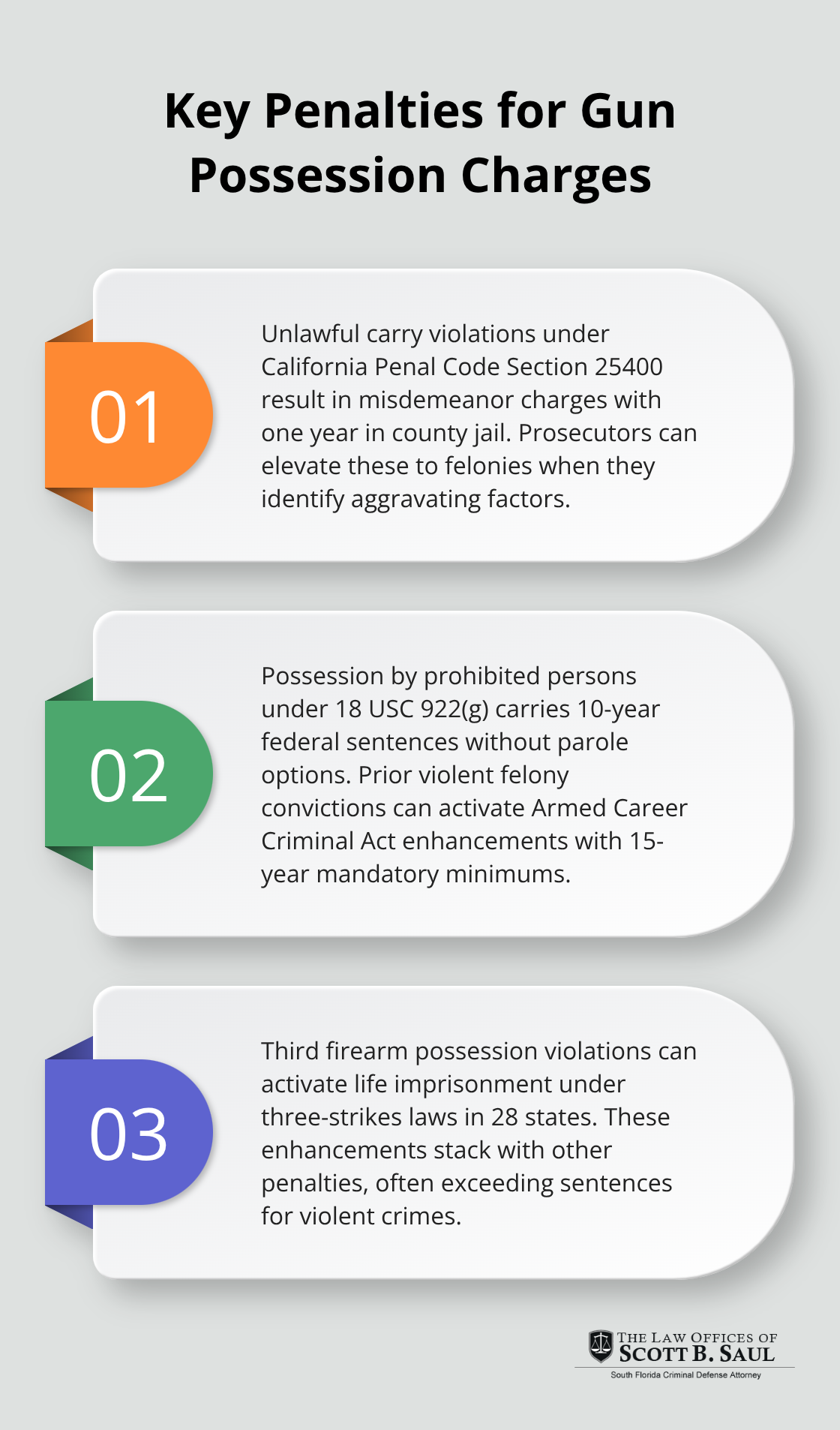What Does Gun Possession Really Mean?
By : saulcrim | Category : Criminal Defense | Comments Off on What Does Gun Possession Really Mean?
29th Sep 2025

Gun possession meaning varies dramatically across federal and state jurisdictions. Many gun owners face serious legal consequences simply because they misunderstood complex regulations.
We at Law Offices of Scott B. Saul see clients charged with possession violations daily. Understanding these laws protects your rights and freedom.
What Makes Gun Possession Legal?
Legal gun possession depends on three factors that interact in complex ways across jurisdictions. Federal law sets the baseline through the Gun Control Act, which prohibits specific categories of people from owning firearms, while state laws add their own restrictions that often exceed federal requirements. Forty-four states include Second Amendment-style provisions in their constitutions, but states like California, New York, and New Jersey impose significantly stricter regulations than federal minimums require.
Federal Requirements Override State Permissions
Federal law prohibits anyone with felony convictions, domestic violence misdemeanors, or specific mental health adjudications from possessing firearms anywhere in the United States. State permits cannot override these federal restrictions. The Bureau of Alcohol, Tobacco, Firearms and Explosives enforces these prohibitions nationwide, which means a valid state permit provides no protection against federal prosecution for prohibited persons. States cannot grant firearm rights to individuals federally disqualified, regardless of local laws or restoration procedures.
Licensing Varies Dramatically by Location
Twenty-five states require no permit for concealed carry, while others demand extensive background checks, training courses, and waiting periods. California requires a permit for any handgun purchase and limits magazine capacity to ten rounds. Texas eliminated permit requirements for concealed carry in 2021 and allows most adults to carry without licenses. These differences create legal traps for travelers who assume their home state rules apply elsewhere (particularly when crossing state lines with firearms).

Carry Methods Have Different Legal Standards
Open carry remains legal in most states without permits, but concealed carry faces heavier regulation. Some jurisdictions treat visible firearms as protected expression while they criminalize concealed weapons. Others ban open carry entirely while they permit concealed firearms with proper licenses. Location matters more than carry method in many cases, with schools, government buildings, and private businesses that maintain their own restrictions regardless of state laws.
Understanding these legal foundations becomes even more important when you consider the serious consequences that await those who violate possession laws.
When Gun Possession Crosses Legal Lines
Federal law defines nine specific categories of prohibited persons who face immediate felony charges for any firearm possession. These categories include individuals with felony convictions, domestic violence misdemeanors under the Lautenberg Amendment, and those subject to restraining orders that involve intimate partners. The Gun Control Act also prohibits possession by anyone adjudicated as mentally defective, dishonorably discharged from military service, or unlawfully present in the United States. Drug users face particular scrutiny, as any illegal substance use documented through arrests, medical marijuana cards, or treatment records can trigger federal prosecution. Mental health records from involuntary commitments create lifetime bans unless states successfully restore them through legal procedures.

Geographic Restrictions Apply Nationwide
School zones carry automatic felony charges under the Gun-Free School Zones Act, which extends 1,000 feet from any school property nationwide. Violations can result in fines up to $5,000, imprisonment for up to 5 years, or both. Federal buildings, courthouses, and post offices prohibit all firearms regardless of state permits. Private businesses maintain absolute rights to ban weapons on their property, and violation constitutes criminal trespass in most jurisdictions. California Penal Code Section 626.9 specifically criminalizes campus possession with three-year prison terms. Airport security areas, public transportation, and government facilities enforce zero-tolerance policies that override concealed carry permits.
Storage Violations Create Criminal Liability
Improper storage becomes criminal when firearms become accessible to prohibited persons or minors. California requires locked storage when children might access weapons, with penalties that reach three years imprisonment under Penal Code Section 25100. Constructive possession rules mean you face charges if someone prohibited gains access to your firearms through inadequate security measures. Vehicle storage creates additional risks, as many jurisdictions require specific lock mechanisms or separate ammunition storage (particularly in urban areas). Home storage violations multiply when domestic violence restraining orders exist, which makes any accessible firearm a federal crime regardless of legal ownership status.
These possession violations carry severe penalties that vary significantly based on circumstances and criminal history, which directly impacts the charges prosecutors file. Presence of firearms during drug offenses can trigger mandatory minimum sentences designed to provide clear deterrent effects.
What Penalties Do Gun Possession Charges Actually Carry?
Gun possession charges impose mandatory minimum sentences that create severe consequences in the federal system. Unlawful carry violations under California Penal Code Section 25400 result in misdemeanor charges with one year in county jail, but prosecutors routinely elevate these to felonies when they identify aggravating factors. Loaded firearm possession in public triggers Penal Code Section 25850 violations with identical penalties, while concealed carry without permits adds firearm enhancement charges that double base sentences.
Simple Possession Violations Start at One Year
Florida courts impose three-year mandatory minimums for possession during commission of felonies, and Texas sentences unlawful carriers to up to 10 years when weapons cross into prohibited zones. Vehicle possession creates additional exposure through constructive possession theories that prosecutors use to multiply charges against all occupants. These theories allow prosecutors to charge every person in a vehicle when officers discover firearms, regardless of who actually owns the weapon.
Prohibited Person Violations Trigger Federal Prosecution
Possession by prohibited persons under 18 USC 922(g) carries 10-year federal sentences without parole options. Prior violent felony convictions activate Armed Career Criminal Act enhancements that impose 15-year mandatory minimums. California Penal Code Section 29800 adds state charges with three-year county jail terms that run concurrent with federal sentences (creating double jeopardy situations that defense attorneys struggle to resolve).
Mental health prohibitions carry identical penalties despite treatment completion, while domestic violence misdemeanor convictions create lifetime bans with no restoration procedures available in most jurisdictions. Drug user prohibitions extend to medical marijuana cardholders, making legal state cannabis use a federal felony when combined with firearm possession.
Repeat Offenders Face Exponential Sentence Increases
Second firearm possession convictions trigger habitual offender statutes that triple base sentences, while third violations activate life imprisonment under three-strikes laws in 28 states. Federal career offender guidelines increase sentences by 300 percent when defendants have two prior violent felony convictions. Firearm possession during drug trafficking adds five-year consecutive terms that judges cannot reduce through departure motions (regardless of the underlying drug quantity).
California’s gang enhancement statute adds 10 years to any firearm possession when gang membership evidence exists, regardless of whether the underlying offense involved gang activity. These enhancements stack with other penalties, creating sentences that often exceed those for violent crimes.

Final Thoughts
Gun possession meaning depends on complex federal restrictions, state regulations, and local ordinances that trap even well-intentioned gun owners. Federal prohibitions override state permits, geographic restrictions apply regardless of licenses, and storage requirements create criminal liability when violated. The difference between legal and illegal possession often comes down to technical details that most people overlook.
Local gun laws change frequently and vary dramatically between jurisdictions. What remains legal in Texas becomes a felony in California. Concealed carry permits from one state provide no protection in another (particularly when crossing state lines with firearms).
Gun possession charges demand immediate legal intervention because prosecutors routinely seek maximum penalties and mandatory minimum sentences that eliminate judicial discretion. We at Law Offices of Scott B. Saul defend clients who face firearm charges throughout South Florida. Contact our Miami-Dade criminal defense team immediately if you face any gun possession charges.
Archives
- September 2025 (9)
- August 2025 (8)
- July 2025 (8)
- June 2025 (9)
- May 2025 (9)
- April 2025 (8)
- March 2025 (9)
- February 2025 (8)
- January 2025 (9)
- December 2024 (10)
- November 2024 (5)
- July 2024 (2)
- June 2024 (2)
- May 2024 (2)
- April 2024 (2)
- March 2024 (2)
- February 2024 (2)
- January 2024 (2)
- December 2023 (2)
- November 2023 (2)
- October 2023 (2)
- September 2023 (2)
- August 2023 (1)
- July 2023 (2)
- June 2023 (2)
- May 2023 (2)
- April 2023 (2)
- March 2023 (2)
- February 2023 (2)
- January 2023 (2)
- December 2022 (2)
- November 2022 (2)
- October 2022 (2)
- September 2022 (2)
- August 2022 (2)
- July 2022 (2)
- June 2022 (2)
- May 2022 (2)
- April 2022 (2)
- March 2022 (2)
- February 2022 (2)
- January 2022 (2)
- December 2021 (2)
- November 2021 (2)
- October 2021 (2)
- September 2021 (2)
- August 2021 (2)
- July 2021 (2)
- June 2021 (2)
- May 2021 (2)
- April 2021 (2)
- September 2020 (5)
- July 2020 (4)
- June 2020 (4)
- May 2020 (4)
- April 2020 (5)
- March 2020 (4)
- February 2020 (4)
- January 2020 (4)
- December 2019 (1)
- November 2019 (4)
- October 2019 (4)
- September 2019 (4)
- August 2019 (4)
- July 2019 (5)
- June 2019 (4)
- May 2019 (4)
- April 2019 (4)
- March 2019 (4)
- February 2019 (4)
- January 2019 (4)
- December 2018 (4)
- November 2018 (5)
- October 2018 (5)
- September 2018 (4)
- August 2018 (4)
- July 2018 (7)
- June 2018 (4)
- May 2018 (4)
- April 2018 (8)
- March 2018 (4)
- February 2018 (4)
- January 2018 (4)
- November 2017 (4)
- October 2017 (4)
- September 2017 (4)
- August 2017 (7)
- July 2017 (6)
- June 2017 (4)
- May 2017 (4)
- April 2017 (4)
- March 2017 (4)
- February 2017 (7)
- January 2017 (4)
- December 2016 (7)
- November 2016 (4)
- October 2016 (4)
- September 2016 (10)
- August 2016 (4)
- July 2016 (4)
- June 2016 (4)
- May 2016 (4)
- April 2016 (4)
- March 2016 (4)
- February 2016 (7)
- January 2016 (4)
- December 2015 (5)
- November 2015 (4)
- October 2015 (7)
- September 2015 (4)
- August 2015 (4)
- July 2015 (13)
- June 2015 (9)
- May 2015 (8)
- April 2015 (6)
- March 2015 (4)
- February 2015 (4)
- January 2015 (4)
- December 2014 (4)
- November 2014 (4)
- October 2014 (4)
- September 2014 (3)
Categories
- Adjudication (1)
- Bankruptcy (1)
- Burglary Crimes (3)
- calendar call (1)
- Car Accident (1)
- Criminal Defense (356)
- Cyber Crimes (7)
- DNA (1)
- Domestic Violence (9)
- Drug Crimes (5)
- DUI (12)
- Embezzlement (1)
- Environmental Crimes (4)
- Expungement Law (2)
- Federal Sentencing Law (3)
- Firearm (3)
- Forgery (4)
- General (82)
- Healthcare (3)
- Immigration (1)
- Indentity Theft (1)
- Insurance (5)
- judicial sounding (2)
- Juvenile Crimes (4)
- Manslaughter (4)
- Money Laundering (3)
- Organized Crime (1)
- Racketeering (1)
- Reckless Driving (3)
- RICO (3)
- Sealing and Expunging (2)
- Sex Offense (1)
- Shoplifting (1)
- Suspended Driver's License (1)
- Traffic (4)
- Trending Topics (1)
- White-collar Offenses (1)

